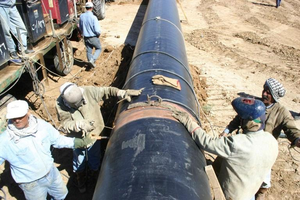Seeking Reconciliation with the Kurds, Turkey Eyes the Oil of Kurdistan
by Halil M. Karaveli (vol. 6, no. 8 of the Turkey Analyst)
The imperative to secure energy supplies and the prospect of continued economic growth entice the Turkish state to seek a democratic resolution of the country’s ethnic conflict. Turkey remains determined to deepen the economic integration with the self governing, oil-rich Kurdish region in northern Iraq, and that in turn makes it necessary to seek reconciliation with the Kurds of Turkey. But it should not be assumed that the prospect of future gains, in terms of prosperity and power, made possible in part by secured access to Kurdish oil, will defuse the Turkish nationalist backlash that is building up. Coping with a nationalist psychology that does not necessarily heed what is “rational” is going to be a major challenge for Turkey’s peacemakers.

The Challenge Ahead for Turks and Kurds: to Form a New National Partnership
by Halil M. Karaveli (vol. 6, no. 6 of the Turkey Analyst)
Abdullah Öcalan’s call for an end to the Kurdish insurgency testifies that the era when violence defined the relations between the Turkish state and the Kurds is coming to a close. Yet what must now ensue will be no less challenging. An enduring peace requires that Turks and Kurds, as citizens on equal footing, negotiate a societal compact. But Turkish nationalism may not be easily tamed, while the question is if Kurdish nationalism can ultimately be contained within an “Ottoman” framework.

What It Will Take to End the Conflict with the Kurds: Can Turkey Transcend Turkishness?
by Halil M. Karaveli (vol. 6, no. 04 of the Turkey Analyst)
A settlement of Turkey’s Kurdish issue requires that the Kurds are satisfied and that the Turks are persuaded. Satisfying the demands of the Kurds will necessarily bring about a redefinition of the identity of Turkey. It will above all reverse the traditional role of the Turkish state, which historically has sought to regiment society; it would enshrine a whole new principle, making it the duty of the state to respect societal diversity and uphold societal freedom. Prime Minister Recep Tayyip Erdoğan may consider deleting references to Turkishness from the constitution, and to allow the Kurdish identity a greater space, but it is less clear that he would also agree to dilute the state’s and his own power.

The Arab-Kurdish Battle in Syria: Implications for Turkey's Standing
by Veysel Ayhan (vol. 6, no. 4 of the Turkey Analyst)
The battle over the Syrian town Ras al-Ain on the border to Turkey and the recent cease-fire agreement between the Syrian opposition and the Kurdish Democratic Union party (PYD) have major implications for Turkey, affecting its relations with the Kurds in Syria, and with parts of the opposition. The battle over Ras al-Ain has not only resulted in the Kurds seeing Turkey as their enemy, but has also led some Syrian opposition leaders to question the role that Turkey plays in their country. The standing of Turkey has been negatively affected as the notion that Turkey could be of assistance in ending the intensified ethnic, religious or sectarian strife that can be expected after the downfall of al-Assad has been dealt a blow at Ras al-Ain.

Turkish-KRG Energy Relations: An Assessment
by Ben Welch (vol. 6, no. 2 of the Turkey Analyst)
Much is made of the grand strategy of the Turkish-Kurdish energy puzzle, particularly by those focused on the geopolitical concept of Turkey as post-Cold War Europe’s energy ‘hub’ – a role which has had increasing prominence since the nascence of the Baku-Tbilisi-Ceyhan pipeline in the early 1990s. However, at the heart of the matter is something more pressing – Turkey’s need to find sustainable and secure energy to perpetuate its decade-long growth-spurt. This is supported by Ankara’s desire to turn its infrastructure, and Istanbul’s financial markets, into a sophisticated regional energy trading centre.








